What can cause a baby to cry before peeing? Most often, this is related to pain, with some underlying explanation.
Let’s go through why a newborn baby cries before urinating here.
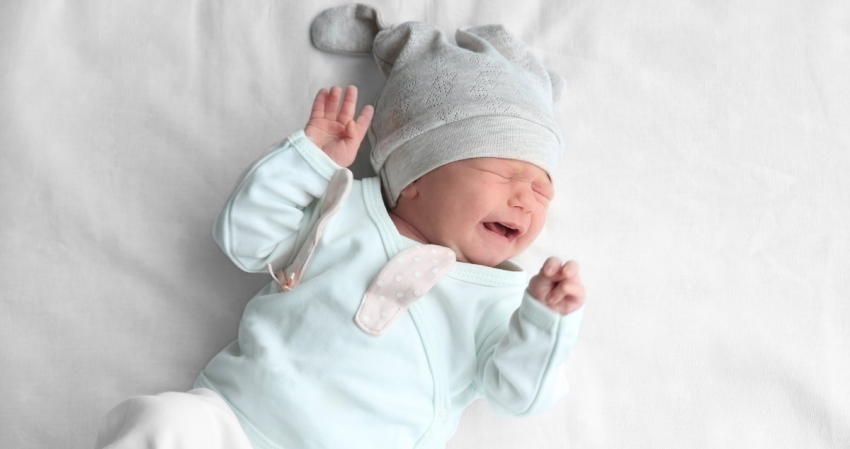
Mom’s Question:
My 3-week-old newborn baby cries inconsolably, at least for 3-4 minutes before she urinates, but not all the time. Sometimes, she cries for a few seconds. She doesn’t cry if she urinates in sleep.
Did anyone face similar problems with their babies? What can it be, and what should I do? Please reply.
Thank you,
Rani
Baby Cries Before Urinating: Causes and Treatment
Crying before urinating could be due to different reasons. And there is a difference between crying for several minutes and only for a few seconds.
1. “Normal” baby discomfort
First off – does your baby seem to be in pain? Crying for several minutes sounds like your baby is in pain. Peeing obviously should not be painful, and the situation needs to be addressed as soon as possible.
Pain can be a medical condition symptom, causing the baby to cry when peeing.
Crying before urination can, to some extent, be expected as babies or infants do not have bladder control as yet. What they feel is the stretching of their bladder as it fills up, which may be interpreted as uncomfortable or painful. Babies still have to strain to pee or poop.
When a baby cries, abdominal pressure builds up, which then causes the passage of urine and poop.
If the baby does not stop crying after urinating, it may, however, indicate that he is in real pain rather than just some degree of expected discomfort.
2. Urinary Tract Infection (UTI)
UTIs occur when bacteria enter the urinary tract via the urethra and grow in the bladder. It is common for babies to have UTIs. Babies with anatomical abnormalities in their urinary tracts are more at risk of having UTIs frequently.
It can be challenging to diagnose urinary tract infections in infants, especially when there are many reasons why a baby may cry at this age.
Here are some symptoms of urinary tract infections in infants:
- Fever
- Irritable
- Crying during urination (due to pain or dysuria)
- Cloudy, foul-smelling urine
- Bloody urine (also called hematuria)
- Vomiting
- Loss of appetite or does not feed
If your baby exhibits some of these symptoms, you should take them to a hospital for a medical consultation. The pediatrician will get a sample of his urine and have it tested for bacteria. Your baby will be prescribed antibiotics and fever medications.
You can find more symptoms of urinary tract infections in infants here and see if your baby has other signs of illness, too.
How to prevent urinary tract infections in babies
It is important always to have good diaper hygiene, as preventing UTIs in babies is challenging because of the use of diapers. But there are things that you can do to keep your baby’s diaper hygienic.
- Always change the diaper as soon as your baby poops.
- Change his diaper as soon as it fills up (you have to check it from time to time)
- Wipe from front to back. Or you can just wash his genitals after peeing or pooping. Wipe with a clean cloth from front to back.
3. Diaper rash
Diaper rash is a common condition in babies. This can occur when the baby’s skin gets irritated with frequently wet diapers (full diapers left on for too long), when there is an infection (which happens when wet diapers are left on for too long, too), and when a baby is allergic to certain types of fabric or chemicals or wipes.
A diaper rash can be sore, scaly, red, and tender to touch.
Check the skin around your baby’s genitals for any rashes, scaling, or redness. This can easily be treated with zinc oxide. Check your baby’s diaper often, and always wash your baby after pooping or wipe properly after peeing. Diaper rash usually goes away within 2 to 3 days.
Learn more about how to mitigate diaper rash here.
How to prevent diaper rash
To prevent diaper rash, you can do the following:
- Change your baby’s wet diaper as soon as possible.
- Wash your baby using gentle soap and warm water. Do not use detergents, bath bombs, or scented soaps. These can irritate and alter the pH of the skin.
- Apply diaper cream after every diaper change until the diaper rash has healed.
- Do not use very tight diapers. You may put the diapers on loosely to prevent chafing.
4. Diaper dermatitis
Diaper dermatitis is the inflammation of the skin around the diaper area. It is a common form of contact dermatitis in babies. The skin gets inflamed and irritated with urine and feces.
The cause of this is similar to UTI and diaper rash: poor diaper hygiene. It can be caused by not changing the diaper often and soon enough, the baby has diarrhea or frequent bowel movement, or your baby is taking antibiotics (which can alter the Ph of the skin), or you are taking antibiotics, and you’re breastfeeding.
Diaper dermatitis can occur differently in children and babies. This includes:
- The irritated skin (usually involving the buttocks, thighs, belly, and waist) is red and shiny. This is an indication of contact dermatitis.
- The skin is deep red and has patches outside the diaper area, also affecting the creases and folds in the thigh and the diaper area, indicating candida diaper dermatitis. There is usually co-existing candidiasis or oral thrush manifested as white patches in the mouth.
- The skin is red with yellow and oily patches. This is an indication of seborrheic diaper dermatitis. This may also appear on the face, scalp, neck, and skin folds.
Consult with your pediatrician for a proper diagnosis. Practice good diaper hygiene to prevent this. You will be given ointments, antifungal creams, or corticosteroid creams for diaper dermatitis, depending on the cause. Antibiotic medicine will also be prescribed if there is a superimposed bacterial infection.
5. Baby Elimination Communication
Baby elimination communication is also known as infant potty training or natural infant hygiene. This supports a diaper-free baby. It is the practice of learning your baby’s cues (communication) and timing for peeing and pooping (elimination) on the potty.
This is a baby’s natural way of communicating very early that they are about to pee. Sometimes, crying before peeing is simply natural and can be used by parents for early potty training. It does not mean your baby is intentionally communicating a need to pee.
Here are some common Elimination Communication signals babies may show:
- Crying
- Sudden fussiness or stillness
- Shivering just before peeing
- Becoming still and staring into space
- Flailing (young baby) or becoming agitated
- Unlatching repeatedly while nursing
- Grunting, becoming red, straining (for poo)
- Tossing and turning restlessly during sleep
How to start baby elimination communication
To start baby EC, you may begin by observing your baby. In doing this, you have to keep in mind that babies pee shortly after feeding. You have to be familiar with their peeing and pooping times. Do not put any diaper on for a time, and observe his body language when he goes. Remember to put him on a waterproof mat.
When he goes, you can introduce cues such as a “pss” sound for peeing or a ”hmm” sound when pooping. That way, he can associate these sounds with letting go.
Always keep a potty nearby. You can bring the potty to him immediately when you see his cues.
Advantages and disadvantages of using baby elimination communication
There are benefits and disadvantages to baby EC. For the benefits:
- You develop a deep connection with your baby.
- Fewer chances of developing diaper rash and UTIs.
- Babies are more comfortable with underwear.
- Babies gain self-esteem as their need is responded to immediately and properly.
- Save money since you won’t have to buy diapers.
The disadvantages include more time and dedication in watching and monitoring the diaper and your baby’s cues.
You can watch this video about baby elimination communication if you are curious:
When to Contact a Doctor
Contact your doctor when any of the following symptoms occur:
- Crying incessantly
- Unexplained fever
- Loss of appetite or not feeding
- Sunken fontanels or eyeballs
- Diaper rash that develops into sores and does not go away with topical agents
- Vomiting
- Blood in the urine
These are all red flags for infection and other more serious conditions.
Takeaway
To conclude, if your baby cries before urinating, take it seriously and assume that something is wrong – most likely a diaper rash or a urinary tract infection. Contact your doctor immediately.
Always maintain good diaper hygiene, as it can save your baby the hassles of infection, irritations, and allergies.
When everything has been sorted out, you can try to observe your baby if you find baby elimination communication interesting to discover.
I wish you good luck!
Paula
Read Next About Urination in Babies
- How Often Should A Newborn Pee? Normal Frequency and Color
- How Often Should A Baby Pee? Your Baby Urine Frequency Guide!
- 10 Important Reasons For Blood In a Baby’s Diaper
- Toddler is Not Urinating: 5 Important Reasons, What to Do
References
- Elimination Communication: Diaper-Free in America
- What are some of the basics of infant health?- Urination
- Urinary Tract Infections in Children: Why They Occur and How to Prevent Them
- Diaper Dermatitis | Johns Hopkins Medicine
Add your comments below, or check out all other posts about babies’ peeing behaviors.

Paula Dennholt founded Easy Baby Life in 2006 and has been a passionate parenting and pregnancy writer since then. Her parenting approach and writing are based on studies in cognitive-behavioral models and therapy for children and her experience as a mother and stepmother. Life as a parent has convinced her of how crucial it is to put relationships before rules. She strongly believes in positive parenting and a science-based approach.
Paula cooperates with a team of pediatricians who assist in reviewing and writing articles.

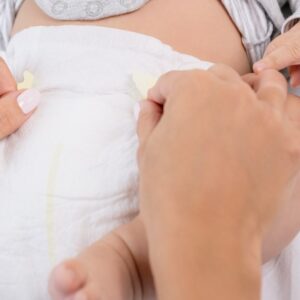
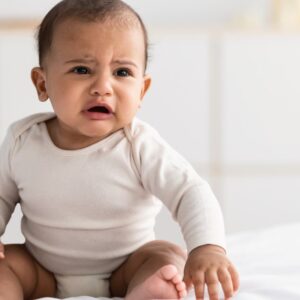

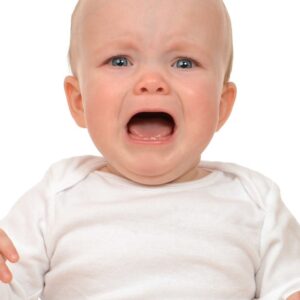
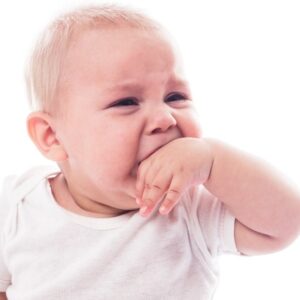
Well, I was nervous and scared when my 10 month old baby boy cried this afternoon. He was screaming and couldn’t pee then i gave him water and i was feeding more water with small breaks, i noticed he want to pee but it was paining him then i filled warm water in the tub and made him sit in the tub for 10 mins then with no pain he could pee. He was not circumcised i checked pulling foreskin everything was good its just due to dehydration i guess…but still i gave a call to my doc and spoke about this he suggested to fill the water in the tub add little baking soda into the water and make him sit in the water for a while so that if there any infection it will wash out…i know its very painful to see them crying my baby is fine now. What i suggest is when you start solids to your babies feed them good amount of water it will help them and there won’t be any pain while urinating.
Our 1 month baby boy cries loud just before urination, whenever his genital get erected due to urine pressure .. Even during sleep he cries in pain. Urine routine examination report is normal. Massage of ointment in the head of the penis and foreskin has fetched No Result..
Please suggest any Tests or Dr or treatment to find out any hindrance or narrowness of the urinary track or aperture .. We need your help as we can’t see our little Boy scream 50 times whenever he feels to urinate.
Hi
Read most of the comments and mine is a similar one, baby wails at times before peeing and before pooping she kicks around. We have realized one thing that before passing gas, she does feel comforted if we help her by taking her legs gently in by lying position and thereafter, she passes either of the three.
Also, using mostly flannel nappis,keeping the temp in the room warm and cosy, as even cold effects their digestive system.
i have a 2. months old baby girl, even she cries before passing urine but she never cries for pee when she is sleeping, well, its common for babies to cryfor their sensitive tummies and bladder pressure, these symptoms ussually fades away after 6 months,the most wondering thing is she starts to play soon after peeing, as if nothing happened. she coos and smiles.if u feel its a matter of concern, then better t walk to ur baby’s pedi… good luck
Regarding painful micturition of female children, it’s commonly due to UTI from infancy till puberty even after! Other causes need further investigation.
In male children, parents should know that uncircumcised children are more liable for UTI than circumcised. Also, they should notice flow of urine of their child is continuos or dripping. In infants, swelling and redness of penis may be noticed especially if the opening of the foreskin of penis is narrow, try to retract it and see if it is difficult to see the glans this means it’s very narrow and you should see a urologist who may do circumcision or widening of the foreskin opening.
Analgesics and antibiotics are routine in such cases. Other causes should be determined by a specialist my advice is to take your child urgently to doctor when he or she cries during micturition because it’s a painful condition and for boys circumcision is very good to avoid UTI recurrent attacks.
Dr Saad Iraq recommends circumcision to avoid UTIs. The risk of UTI is indeed lower in circumcised boys, but I think it is appropriate to say that the risk is low in general for boys. You can read one research study on UTIs in circumcised vs. uncircumcised infant boys here.. The American Academy of Pediatrics recommendation on circumcision basically says that new evidence points to greater benefits of infant circumcision but that the benefits are not strong enough to recommend it as a general procedure. The final decision should still be up to the parents.
Follow up… After a few urine tests at the doctor, we found no uti issues. Our best guess is that she’s allergic to something we’re using and leaning towards the baby wipes, causing irritation when she pees. So we only use flannel wipes now (1 week into it) and are using diaper rash cream to help calm the redness. Otherwise we’re using cloth diapers with really mild detergent, warm water baths (no soap). I may try soy formula if the problem continues but I’ll have to research that further.
I’ve been experiencing the same issues with my 1-month-old daughter. She cries like a normal baby (hungry, dirty diaper, tired, etc) but just before she pees and during, she wails, turns red, clenches her fists and squirms all over. After a month of getting to know her, I can definitely tell a normal cry, and a pain cry. I took her to the doctor and the doctor did a did a urine test (used a catheter to get a urine sample- not fun) and the urine came out cloudy… we’re still waiting for the test results but she’s on Amoxicillin antibiotics now. There’s some improvement (day 3) with less intense crying but she’s still pretty uncomfortable. I’ll post a follow-up once I get the final results. Good luck, everyone; this is stressful to go through.
My baby girl is 2-1/2 months. She applies force before urination.
it is normal.When urine is full in the bladder, it creates pressure and pain.
My son is now 1 month old. He used to pee continously and one day he startd crying for hours straight and didn’t pee once. We went to the doc and found out he had a uti. Now again, he is crying while peeing and the doc is going to run some tests and may have to scan him too… It’s been such a trying time. He has been admitted twice at the hospital.
My 6 Month baby girl applying so much pressure before urinating, This we are watching form last 1 month, What is the problem can anyone help.
Hi same here my 4 month old tends to cry before he urinates not all the time but sometimes. Funnily though he never cries when he pees when his diaper is off. He is not prone to nappy rash, but it seems obvious to me that he dislikes peeing in the diaper. Coz if he’s in pain when he urinates, he would cry even with the diaper off, no?
My baby boy was the same – at 6 months he is getting better – but it really only seemed to happen when his diaper was on, so we concluded that he didn’t like peeing in a diaper. Look up ‘elimination communication’… I started using some of the techniques, specifically signaling and timing, and now he usually just pees on a washcloth when I take of his cloth diaper and then we put it back on. Much happier :)
My 1-year-old daughter cries inconsolably at least for 5-10 minutes before she urinates. But not all the time. Sometimes she cries for a few seconds. She doesn’t cry if she urinates in sleeping time or sometime she cry mid night. Did anyone face similar problems with your baby(ies)? Please reply.
thank you. Suhas
@suhas :) my girl baby is experiencing d same prob as urs for d part one week. she is 13 months old. mm reeli worried. once d reports come it will be known what exactly is d prob she s facing. regarding babies putting pressure when they r 5 or 6 month old,its juz nothing to worry cuz my baby did n i gav no medicine.so do not panic when baby puts pressure, worry comes when they cry. good luck n take care of ur lil angels.
My nephew is 1 and half month old, screams before while and after urinating .. When we contacted doc ..they said everything is fine after doing some tests. He advised some antibiotic tablets .. but still, we are worrying?
will there be any problem .. some doc say may be bcs of a narrow line ..Does anyone experienced the same ??
My 1half mnths daughter cries before urinating .Especially when she is taking my feed. My doctor told that it could be the reflex action in infants and it is nothing to worry.
My girl baby is one and a half month old and she cries continuously /screams continuously after urinating. But she doesn’t cry every time though she mostly cries. Even though the doc said it’s due to colic, I have my doubts. Her skin is reddened on her back but it’s very tiny. Is this due to any Urinary infection or colic pain or rash issues or anything else? Do let me know if anyone has the same problems.
hi, my 3 week old daughter also cries before she pees. but not all the time. only when she is awake, if she feels like urinating, she cries and stops crying once she pees. I am in India and have a normal diet. Maybe I should stop eating spicy foods? please suggest.
yes, I feel y’all… I hate to see my baby cry as well.. yes even if its only 30 sec. and yes its when he pees…. and yes the penis is red and had some bleeding.. my son is 3 weeks old. so I thought the penis was fully healed. I guess not… so sad tears… wish me luck on his recovery.. good luck with your babies.. and congrats…
I’m one of the moms who posted her problem here before & the problem was fixed after almost a year. Anyway, if you have a boy who is not circumcised, try pulling the foreskin & see if the head and around the head are red. It can be hidden under the foreskin near the end of the head, so try little by little to see. If it is difficult, ask your doctor if he can tell you why or if you can be seen by a specialist. That was the problem my baby boy had.
I wish all of you good luck!!
My 8-week-old son also screams/cries in pain prior to urinating – he is otherwise very calm. Of course, he when hungry/tired etc., but this cry is different… before he urinates, he screams, kicks, gets bright red, goes all rigid, and seems to be in pain. I took him to ER this evening – referral to a urologist… I’ll let you know what I learn.
My daughter stopped crying after her first month. Apparently, (this is what the doctor said), some kids do not understand the “feeling to pee”. They are bothered by that feeling, and they cry. This is true in my daughter’s case because she is like that. She is 2 and a half yrs old and doesn’t like lots of things, a long list of things that other kids seem to enjoy or don’t mind. I know she will get over these eventually.
My 2-month-old son continues to cry except the time when he is nursed. I have consulted two or more specialists, but their medicines failed. I am much worried about him. What might be the problem.? Very rarely, he keeps quiet.
My 2-month-old son screamed in pain before urinating, and my doctor said, “Some babies have colic”(the UTI test was negative). My son does not have colic; he is very calm and cries normally when hungry and such. But prior to urinating, he screams, kicks, and is in so much pain. The doctors act as though I am overreacting, but I hate to see him in this pain, even if it only lasts about 30 seconds.
Believe it or not, it is very common for young babies to cry before and while urinating. They are giving you cues that they need to potty. When we ignore these cries and teach them to use a diaper, they eventually stop telling us they need to go.
Yes, there can be medical issues like a UTI or diaper rash, but in very young, healthy babies, they are most likely just telling you they need to pee – the only way they know how.
This is also very common and natural in other countries.
Hi my six month old boy baby was affected by UTI.. we founded by urine test about his PUS cells high. Then we are admitted in the hospital to reduce the level of Pus cells.. he recoverd after one week. But now also he is in struggle to peeing especially in night. His main problem is while he is sleeping suddenly he screams for 2 mins and put a pressure to pass urine…but he is totally fine at morning… every night we face this problem don’t know wht to do… Pls tell us any medication or treatment….
Hi Asma,
Poor little one! You need to take your son back to the doctor. It sounds like he might still have a UTI. The fact that it hurts more at night could be due to him peeing less frequently at night and it becomes more painful for him to pee. Or he is swollen and has some infection. But please don’t wait with taking him back to the hospital!
Good luck and let me know how things go,
Paula
My son had this problem but it is finally fixed. I was sent to a specialist and she found out that the head of his penis was red ( some irritation) and gave me a cream to put on that. After 3 days, no more crying.
Believe it or not, it is very common for young babies to cry before and while urinating. They are giving you cues that they need to potty. When we ignore these cries and teach them to use a diaper, they eventually stop telling us they need to go.
Yes, there can be medical issues like a UTI or diaper rash, but in very young healthy babies, they are most likely just telling you they need to pee – the only way they know how.
Do a search for elimination communication and you’ll find lots of stories of parents whose babies successfully use the toilet. This is also very common and natural in other countries.
My 7 week old seems to be crying just before he urinates. If this is the case it must be an internal problem, right? Not a diaper rash. He does get happy when I remove his diaper – – usually after I get peed on. :-)
I have the same problem with my 2 month old son. It’s going on since he was born. The doctor did a test for UTI, but it was negative. He is breastfeeding, so I think it’s not the formula problem.
Yesterday I even found a pink spot on his diaper (blood). I called the doctor & he said not to worry. I’m trying to get the doctor to send me to the specialist. Will let you know if something comes up.
Iveta
My baby has the same problem. The dr told me to change my formula to a soy based formula. I really don’t think the formula is the problem, but I am going to try it.
My two week, bottle fed daughter was having hysterical fits right before peeing/pooing. Her body would stiffen, her face would turn red and she would scream as if in pain. I would open up her diaper to find it dry, but seconds later she would let loose and pee. The only difference when it was poo was that she would grunt a little between screams. So I looked up EC (Elimination Communication) as suggested by some here, and WOW. My two week baby girl is eliminating in the toilet!
She still screams and throws a fit, but fewer times in the day because I take her to the bathroom in anticipation first thing in the mornings, after every feeding during day and last thing before bed.
Hi, my 4month daughter applies force before urinating.. can ny one tell me what could be the reason??
Hi, my 3 weeks old daughter cries badly before peeing for atleast 2-3 min. We went for urine test and it came out negative. Our doctor said it’s okay and nothing to worry. But the problem still persist.
I found her vaginal area is slightly red .
Can someone suggest what should we do ?